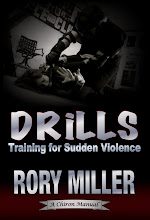In the early eighties a guest lecturer for a criminology class gave insight and advice: "Life boils down to two questions," he said, "What do you want? And what are you willing to pay- in time, sweat, dedication and money to get it?"
Sometimes the price is high. If you are not willing to pay, perhaps you don't want it enough. That's simple maturity. A child wants to acheive the same goal at a lesser price. Often in life the value is in the price.
The two-man kata of traditional Japanese jujutsu were a very sophisticated training method. You were teaching young bushi to kill an armed and armored warrior quickly. Training armor wouldn't help, since you were training to defeat real armor. If you altered the technique for safety, the alteration would become a habit and the warrior would pull his punches under stress. Their solution was for uke to attack with full power, speed and commitment. Tori countered, also, with full power, speed and commitment and then uke would do the one specific thing that would be counter-intuitive on the battlefield but would save him in kata. In Tori ire, uke drops his sword to prevent falling on the tsuba with full body weight focused over his floating ribs. In Kawashime, uke goes limp to prevent his spine from shearing. In Munadori, uke must jump with toe flexion or his collarbone is shattered. Etcetera.
Kata can be done many ways. Most learn the forms and learn them well enough to teach and move on. They become stale, stylistic rituals.
But there is more here. Not from all instructors and not for all students, but there is much more. When Bo and I were training kata to prepare for our cerification, it was very intense. It started with the moves and then speeding it up. Then sensei insisted we add true commitment. When we were uke, we struck at each other (with boken to the head) full force, full power. The only thing in uke's mind was "to cut". If I hand someone a boken and tell them to hit me in the head as hard as they can, very, very few will even be able to do it in a half-hearted way. Most that do swing, when I look in their eyes, will freeze at the last minute, sometimes even pulling muscles to stop from hitting.
From that point on, Bo and I were trusting each other to strike to kill, for real, every time.
Then sensei insisted we "wait in stillness" before moving (to be fair, we'd always done this, but with the introduction of killing intent there was a new level and new consequences). This changed the drill. If uke sensed any movement from tori, uke altered the attack. In other words, uke would strike at the head and if tori moved too soon uke would drop the strike and slam you in the ribs. Tori learned to wait and then explode.
Tachypsychia is the term for the sensation that everything is going in slow motion. It sometimes happens under extreme stress. This is the only training I've ever undergone or even heard of that taught you to consciously access this state.
The last stage was to apply this without the safety of kata. In other words, we would assume position and uke could attack in any way that he chose. Freeform kata, if you will. We found that the responses were rarely out of kata, but highlighted the principles.
What did we get from this? Some criminal screaming that he's going to kill me just isn't intimidating any more. There is more time in a second than I need. I can be still and I can explode. I learned to deal with what is there and not what I expected.
What did it cost? It was dangerous. One of my uke's tried to do an intuitive breakfall and his collarbone was in three pieces. I sprained my neck several times going limp a fraction of a second late. I still remember that second of slow motion time when I realized that Bo was about to land on his bent neck with full force and me yanking to get his body over in the last six inches of falling space... spraining his neck badly but not killing him.
And there was a cool-down period. For much of the last part of this training I couldn't spar. I was on a hair-trigger and couldn't even think of a non-lethal response to anything. It took a while to wear off, because even in a maximum security jail that level of preparation is frowned upon by society.
There's always a price.
Three-Eighty or Thiry-Eight?
-
L., S&W Model 60 Chief; R., SIG P238
.38 Special versus .380 ACP.
Out of a full-sized sidearm, the .38 Special is the more effective round.
The bullet...
2 months ago



No comments:
Post a Comment